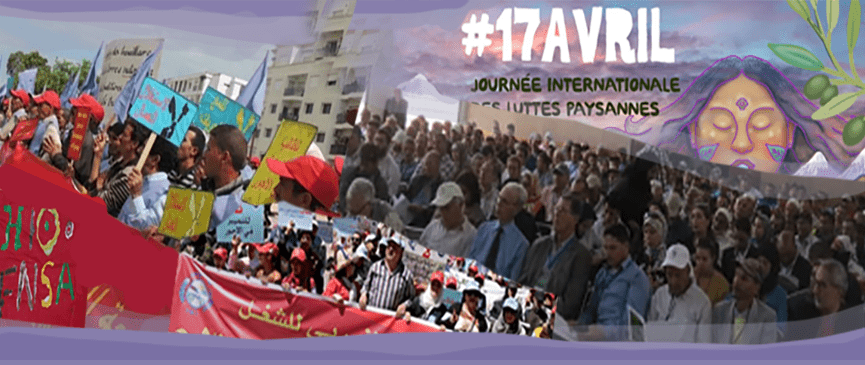Morocco: Peasant Union Opposes Land Privatization, Calls for UNDROP-aligned Policies

On April 17th, the National Federation of the Agricultural Sector commemorated the International Day of Peasant Struggle, highlighting global and national peasant resistance for social justice. In its statement, FNSA highlighted that in Morocco, peasants face poverty and marginalization despite their central role in supporting food production. The FNSA condemned the continuing neglect of peasant farmers and farmworkers. It called for advocating for policies ensuring food sovereignty, environmental justice, and peasants’ rights. It calls for dialogue on peasant issues and urges adherence to UN Declarations on Peasants’ Rights (UNDROP).
Read the Full Statement here issued by the Executive Secretariat of the FNSA Rabat; April 17, 2024
Morocco: Paving the way towards agricultural justice
On April 17th, the National Federation of the Agricultural Sector, a member of Via Campesina, celebrates the International Day of Peasant Struggle to commemorate and highlight the resistance of peasants worldwide, emphasizing their ongoing activism for social justice and dignity.
On this occasion, the FNSA recalls the working and living conditions of peasants in Morocco, characterized by poverty and marginalization. It reminds officials of the crucial role peasants play in ensuring the food supply for our people, unlike export-oriented agriculture, which receives significant attention in official agricultural policy, marginalizing labor, negatively affecting the fertility of our agricultural land, and depleting our water reserves to meet foreign market demands.
The FNSA confirms and declares the following:
- Denounces the government’s persistent disregard for the demands of small farmers and land workers while directing subsidies and incentives primarily towards large investors in the sector.
- Highlights the deep crisis facing the agricultural and forestry sector due to the absence of agricultural policies ensuring food sovereignty for our people, preserving natural resources (soil, water, forests, environment), addressing climate change, and improving the social situation of farmers and agricultural workers.
- Stands firmly alongside Via Campesina to resolutely combat genocides, wars, violations of people’s sovereignty, displacement of farmers from their lands, violation of their rights, and the withholding of agricultural inputs—particularly seeds—by multinational corporations. It also pledges to fight against the interference of neoliberal institutions such as the World Trade Organization, the World Bank, and the International Monetary Fund in shaping national agricultural policies, endangering the livelihoods of farmers and agricultural workers.
- Notes the lamentable failure of “alternative crops” that replace cereals, the foundation and cornerstone of food security, with other crops, without considering the evolution of cereal cultivation and the growing interest it arouses worldwide.
- Confirms that the policy of privatizing agricultural land and forest areas and transferring them to large landowners, real estate speculators, and agricultural companies, as well as the waste of irrigation water, will not solve the sector’s crisis but will only lead to environmental disasters and stifling social crises that will cost dearly to workers, small farmers, villagers, and all citizens.
- Calls for the elimination of tax exemptions for large farmers, landowners, and foreign companies, while denouncing the fact that state subsidies benefit this category; and calls for justice for small farmers by strengthening support for them, alongside a policy that serves their interests in the field of loans. (It is inconceivable that an agricultural investor is exempted with a net profit of up to 40,000 dirhams per month, while the technician working on his farm pays about 500 dirhams in income tax).
- Calls for the adoption of a food policy combining agricultural production and maritime fishing to ensure food supply and guarantee that citizens have purchasing power to access food through a general increase in wages, while ensuring the quality and sanitary safety of food.
- Considers that the agricultural policy adopted in relation to unfair free trade agreements will inevitably lead to disaster throughout the country, especially in rural areas, and that the true alternative for rural prosperity, achieving the well-being of its inhabitants, and breaking free from food dependency is to carry out comprehensive and democratic agricultural reform that gives land to those who work it and restores the state’s role in controlling and qualifying the sector.
- Finally, calls on the government to respect the content of the United Nations Declaration on the Rights of Peasants, which Morocco ratified on December 17, 2018, and to implement it on the ground, starting with a serious and responsible dialogue on peasant issues in accordance with Chapter 9 of the declaration.
This post is also available in Français.
